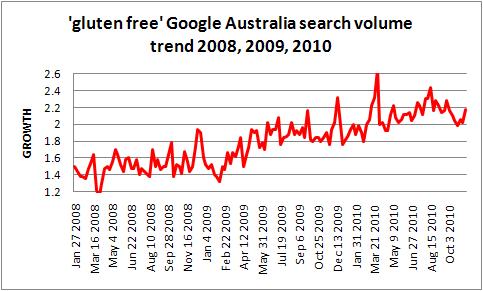
Gluten is a protein composite found in foods processed from wheat and related grain species, including barley and rye. Source: Wikimedia Commons
1 in 7 people worldwide are now thought to be gluten intolerant, according to research by the Peer Reviewed Medical Journals.
Gluten intolerance, or sensitivity, is when gluten has an adverse effect on the body, creating uncomfortable symptoms.
It differs from the more serious, celiac disease.
Dr Sharon Marks is the Head of the Clinical Nutrition and Metabolism Unit at Monash Medical Centre and deals with people suffering from gluten intolerance.
“Gluten intolerance and celiac disease are different, but have similar symptoms.”
“You can be accurately diagnosed for celiac disease through a biopsy. If the antigliadin antibodies are shown to be positive, you have celiac disease. If you were just gluten intolerant the result would be negative,” Dr Marks said.
“Gluten intolerance has definitely increased in recent years. I have no doubt seen many more patients suffering from it than ever before.”
Megan Yeomen, a Latrobe University physiotherapy student, is just one among many who suffers from the uncomfortable condition.
“I feel the symptoms almost immediately in my stomach if I eat anything containing gluten. I experience bloating, light headedness, cramps, nausea and often this is followed by constipation or diarrhoea,” Yeomen said.
According to recent reports, 18 per cent of the population are now buying gluten-free products, a 28 per cent increase from 2008–2012.
There has also been a steady increase of Australians ‘googling’ gluten-free related terms, as evident by the research below, which indicates the population has a growing fascination with the concept.

Australians are increasingly interested of the benefits of going gluten-free. Source: Gluten Free Pages
But whilst the availability of gluten-free products has improved, it is often difficult to distinguish what is truly gluten-free.
“It is a real inconvenience. Many restaurants offer gluten-free options, but often the condiments used contain gluten,” Yeomen said.
Being gluten intolerant also comes at a high cost.
“Gluten-free bread and flour are almost 4 times more expensive than regular bread and flour,” Yeomen said.
Gluten-free foods have experienced exceptional growth and sales in Australia and are predicted to reach $US98 million by 2015.
Dr Marks believes the increase is also likely due to the perceived health benefits of a gluten-free diet.
“People who don’t experience symptoms have no reason to lower their gluten intake. It is a common myth that eating gluten-free is linked to weight loss. So long as you consume gluten in moderation, as with all food groups, it is fine.”
See below for a more detailed look at what gluten sensitivity is.
Celiac Disease & Gluten Sensitivity with Dr. Tom O’Bryan
► FREE 133-Page JERF Cookbook: https://goo.gl/221qxM Learn more about Dr. O’Bryan at http://www.thedr.comCeliac Disease & Gluten Sensitivity with Dr. Tom O’B…
